MercoPress. South Atlantic News Agency
Tag: Mercosur
-
Saturday, July 18th 2015 - 09:29 UTC
Mercosur agrees to give intra-trade a new boost eliminating barriers
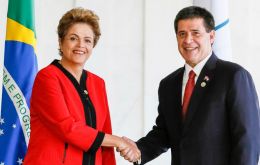
Mercosur agreed at the Brasilia summit that in the second half of the year they will address alternatives for the elimination of tariff and other similar barriers that impede the natural flow of trade of goods and services among its members. The initiative was agreed by Common Market Council, CMC, on the first day of deliberations and confirmed on Friday by the presidents of the group's full members.
-
Saturday, July 18th 2015 - 09:15 UTC
Cristina Fernandez hails Mercosur success in integration and in promoting a political block
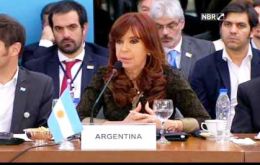
In what can be considered her last speech before a Mercosur summit, Argentine president Cristina Fernandez, who is stepping down next December, hailed what she called the “magnitude of the importance of integration” in South America with the inclusion of both Venezuela and Bolivia showing the “success and the resounding failure for those who forecasted for years that the Mercosur was going to fail.”
-
Friday, July 17th 2015 - 07:14 UTC
Uruguay after a Mercosur 'action plan' to eliminate all inter-trade restrictions
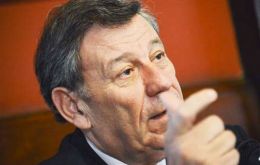
Uruguay is attending the Mercosur summit in Brazil hoping the group implements deep changes, particularly referred to the free circulation of goods, services and production factors, and considers a six month period should be sufficient trial for the changes to become effective.
-
Thursday, July 16th 2015 - 09:28 UTC
Paraguay, as chair of the group, determined to return Mercosur to 'its roots'
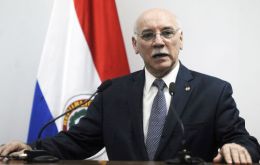
Paraguay is committed to return Mercosur to 'its roots', reach an agreement on some of the original fundamentals, eliminate restrictions to inter-trade and strongly promote the trade accord with the European Union. This is scheduled to take place in the coming six months once Paraguay is handed Mercosur' chair at the group's midyear presidential summit that begins on Thursday in Brasilia.
-
Thursday, July 16th 2015 - 09:03 UTC
Bolivian private sector not convinces of full incorporation to Mercosur
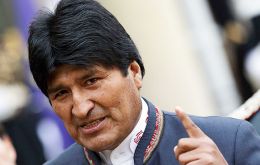
Bolivia's incorporation as a full member of Mercosur will be addressed as of Thursday in Brasilia at the group's two-day presidential summit, an issue which could be completed by the first half of next year, despite some warnings from Bolivia's private sector.
-
Wednesday, July 15th 2015 - 08:10 UTC
Mercosur summit in Brasilia with a conflicting agenda; Paraguay takes chair

Mercosur will be holding its half year presidential summit in Brasilia next Thursday and Friday, an event which will expose an abundance of trade and political conflicts, discrepancies and recurrent challenges despite all its members commitment to integration. Besides full members, Argentina, Uruguay, Paraguay, Venezuela and Brazil, leaders from Chile, Peru, Ecuador, Bolivia, Colombia, Guyana and Surinam have also been announced.
-
Thursday, July 2nd 2015 - 06:24 UTC
Chile insists with Pacific Alliance/Mercosur intelligent convergence
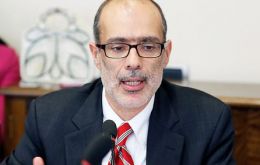
Chile will insist at the two-day Pacific Alliance summit which took off on Wednesday in Paracas, Peru, that a convergence with Mercosur is needed to ensure the integration of Latina America, and this is more evident now that both groupings face similar challenges such as falling prices for commodities, normalization of US monetary policy and an international context of slow growth.
-
Thursday, July 2nd 2015 - 06:13 UTC
Mercosur summit will establish 'action plan' to speed discussions with Europe
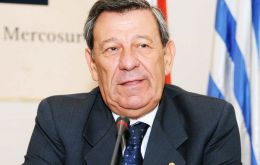
The Mercosur Council will establish an “action plan” at the next Mercosur presidential summit scheduled for 16/17 July in Brasilia, when the group's chair for the next six months will be handed to Paraguay by Brazil. Other issues on the agenda besides making Mercosur more flexible include addressing the 'special regimes' and the 'free trade zones' in the area, revealed Uruguay's foreign minister Rodolfo Nin Novoa.
-
Tuesday, June 23rd 2015 - 07:43 UTC
Uruguay and Paraguay meet to talk about Mercosur, ports and energy

Mercosur, ports, energy, trade are among the issues in the agenda that Paraguayan president Horacio Cartes will consider with his counterpart Tabare Vazquez when he makes a one day visit on Thursday to Montevideo, according to the Uruguayan ambassador in Asunción Federico Perazza, ahead of the meeting.
-
Thursday, June 18th 2015 - 07:08 UTC
Mercosur/EU hope 'for positive news in third quarter' despite members' domestic problems
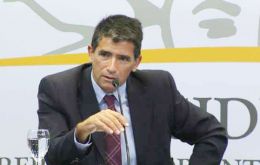
The European Union also has difficulties in completing a draft proposal of goods and services to exchange with Mercosur in the search for a long delayed trade agreement between the two blocks, revealed Uruguayan vice-president Raul Sendic during a report to the Senate on his recent 10/11 June trip to Brussels for the Celac/EU summit. However in “the third quarter of the year there should be positive news”.
